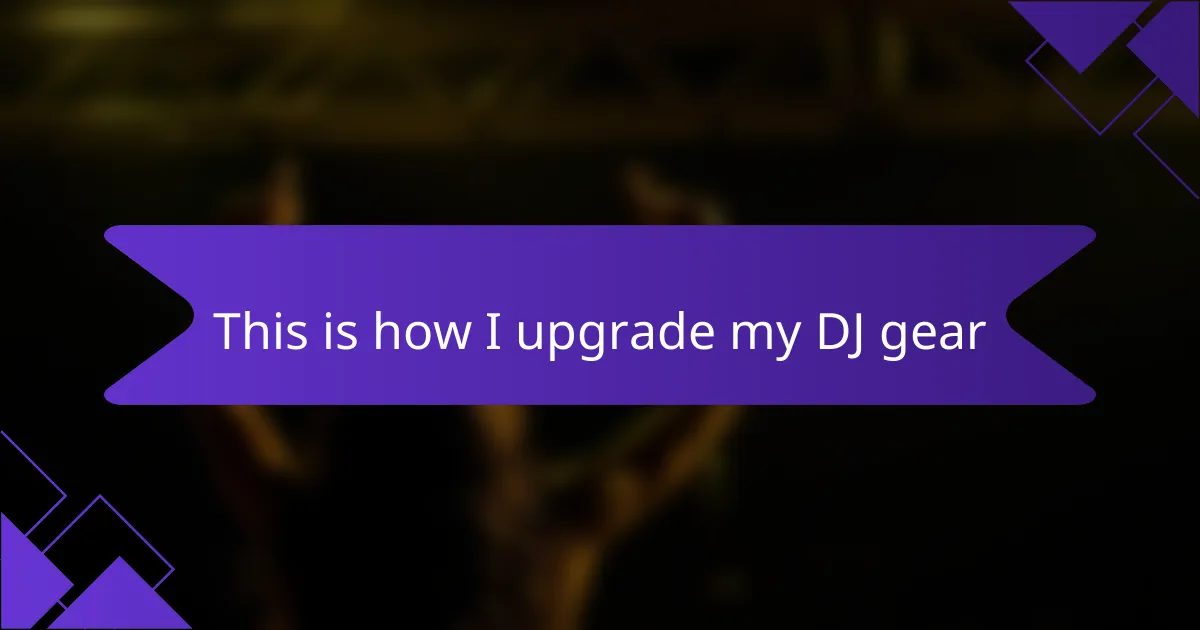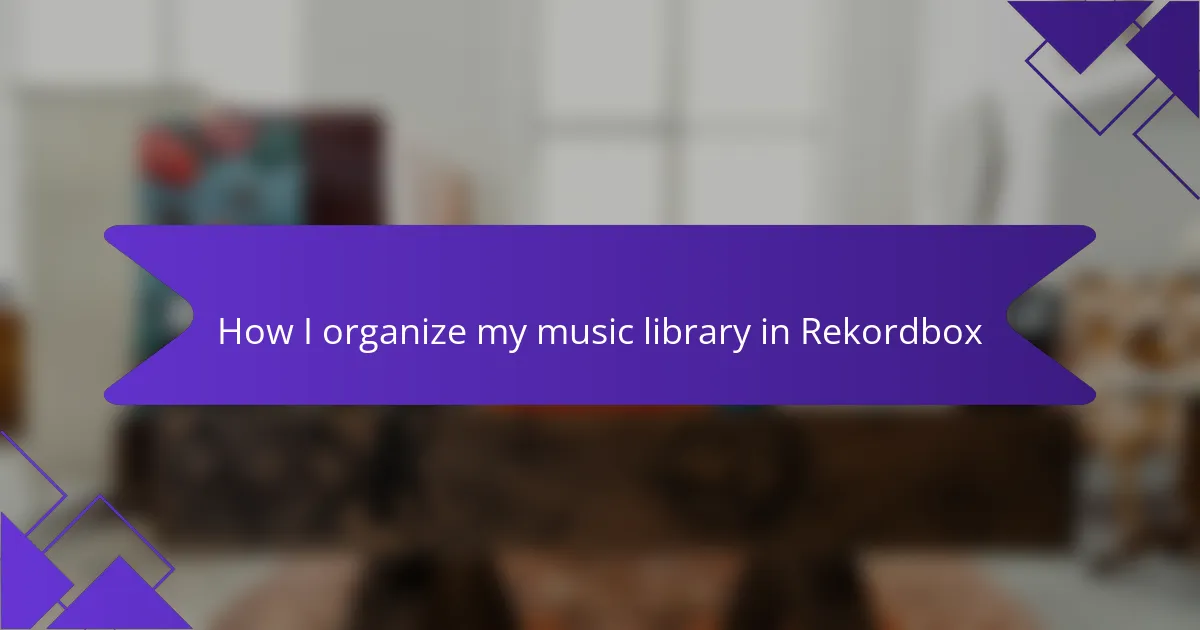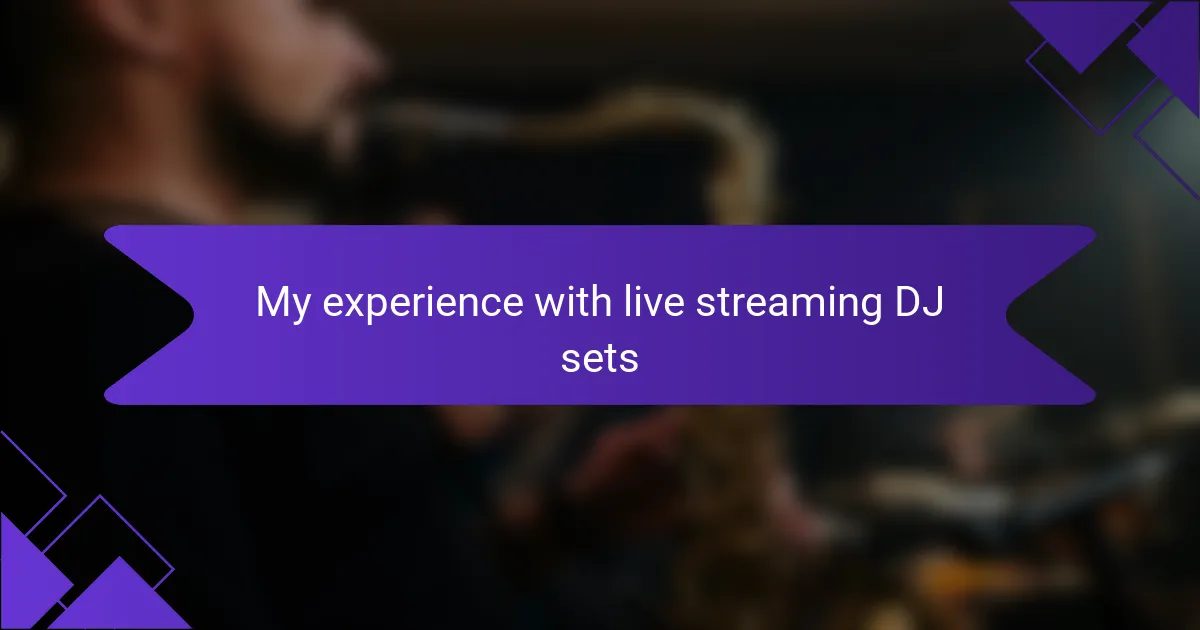Key takeaways
- DJ entertainment involves mastering music mixing, crowd engagement, and creating a unique atmosphere.
- Skilled DJs enhance festival experiences by connecting with audiences and fostering a sense of community.
- Challenges at large events include technical issues, crowd control, and performance pressure, which require adaptability.
- Aspiring DJs should focus on developing their unique sound, networking, and practicing in various settings.
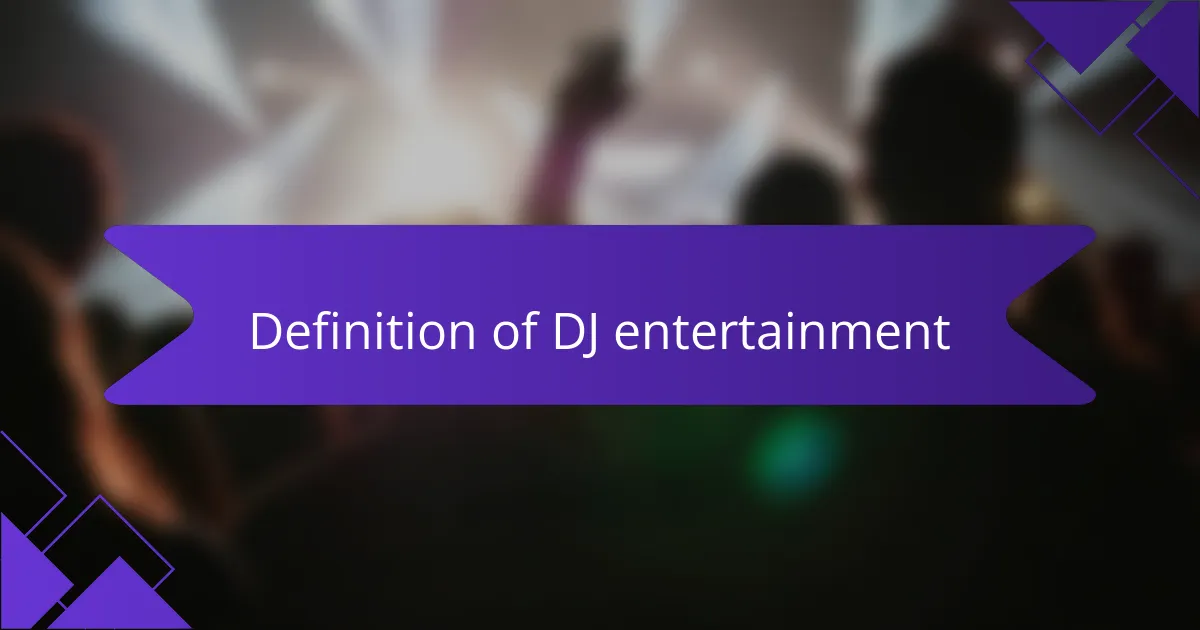
Definition of DJ entertainment
DJ entertainment encompasses the art of mixing and blending music to create an electrifying atmosphere for audiences, particularly at festivals. It’s fascinating how a skilled DJ can read the crowd, choosing tracks that resonate on a deeper emotional level, pulling listeners into a shared experience. I remember the palpable excitement at a festival when the DJ dropped a track that sent waves of energy through the crowd; it’s moments like these that illustrate the power of music.
In this context, DJ entertainment not only includes the technical aspects of mixing but also involves an understanding of crowd dynamics and atmosphere. The ability to transition smoothly between genres can elevate a simple performance into something extraordinary. Here’s what I think defines DJ entertainment:
- Mastery of mixing and beatmatching techniques
- Selection of music that resonates with the audience’s mood
- Creating a unique atmosphere through visual elements and stage presence
- Interaction with the crowd to enhance engagement
- Use of technology and equipment for creative sound manipulation
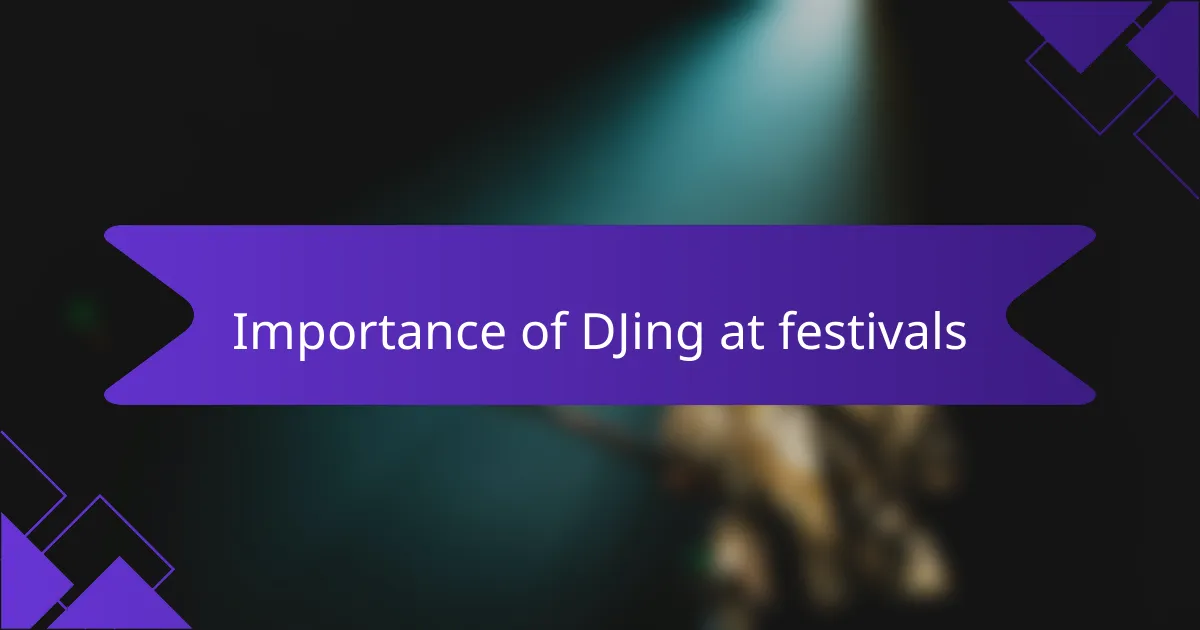
Importance of DJing at festivals
DJing at festivals plays a crucial role in shaping the overall experience for attendees. From my perspective, a skilled DJ can elevate the atmosphere, creating moments of connection and joy that linger long after the event ends. I remember the feeling of exhilaration when I stood among thousands, lost in the rhythm of the music, and it was the DJ who crafted that unforgettable experience.
The resonance of the music, the way it pulses through the crowd, is something truly magical. It’s not just about the beats; it’s about the community formed under the sound waves. As I’ve observed, a great DJ can transform a sea of strangers into a unified celebration of life, love, and music through their set.
- DJ sets create a unique atmosphere that enhances the festival experience.
- A talented DJ can connect with the crowd, influencing their emotions and energy levels.
- Festivals rely on DJs to curate a journey, ensuring each moment feels meaningful and engaging.
- The interaction between DJs and festivalgoers fosters a sense of community and belonging.
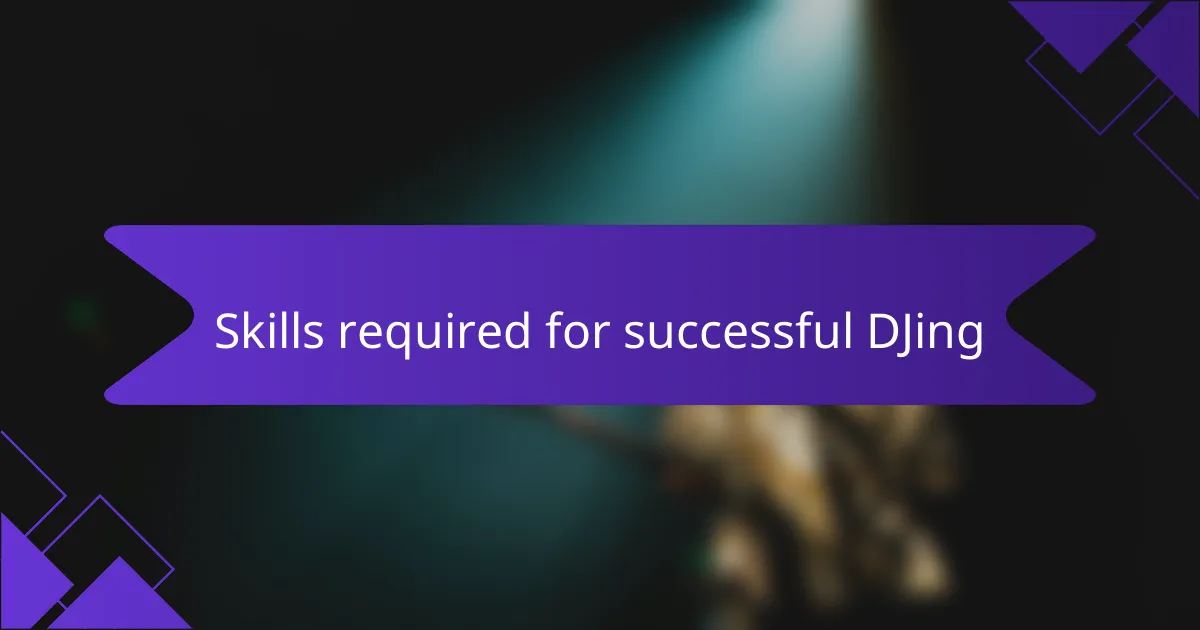
Skills required for successful DJing
To excel in DJing, one of the fundamental skills required is the mastery of mixing and beatmatching techniques. This isn’t just about playing songs back-to-back; it’s about creating a seamless flow that captivates the audience from start to finish. I recall the first time I managed to beatmatch live during a set – the rush of adrenaline was unmatched, and the crowd’s reaction made every nerve-wracking moment worth it.
Another essential skill is selecting music that resonates with the mood of the crowd. It’s a bit like being a musical empath; you need to sense the energy of the audience and choose the right track to elevate that experience. I’ve found that taking risks with unexpected song choices can lead to explosive reactions. Remember that moment when a DJ plays that one song everyone loves? It’s pure magic.
Lastly, interacting with the crowd can make all the difference. Engaging with festivalgoers and feeling their energy creates a feedback loop that enhances the performance. There’s something special about waving your hands in sync with thousands of others; it’s electrifying! This connection not only amplifies the atmosphere but also leaves a lasting impression that lingers in shared memories. Wouldn’t you agree that those interactions are what transform a simple DJ set into an unforgettable experience?
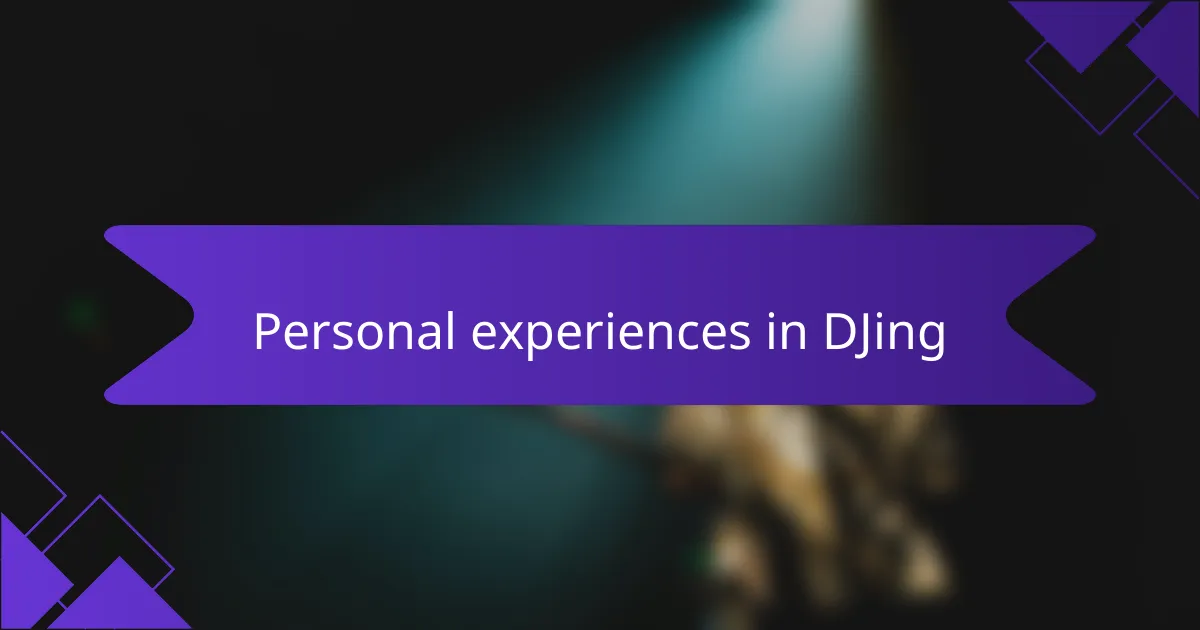
Personal experiences in DJing
The experience of DJing at festivals is unlike any other. I vividly remember my first festival set; the sheer excitement and nerves were overwhelming. As I stepped onto the stage, I felt the collective anticipation of the crowd. In that moment, I realized that the performance wasn’t just about me—it was about creating a shared experience with everyone in the audience.
There’s something incredibly rewarding about seeing the crowd respond to my track selections. During one of my sets, I dropped an unexpected remix that instantly changed the energy in the air. People started dancing with such joy that it felt like I was part of a living, breathing entity. In those moments, I often wonder: how does a simple song become a vessel for our shared emotions? It’s a beautiful transformation every DJ experiences when they connect with their audience.
Every festival teaches me something new about the art of DJing. I recall a time when I misread the crowd’s mood and played a track that fell flat. It was a learning moment, reminding me of the importance of adaptability. As DJs, we must remain attuned to the ever-shifting energies around us, which is a challenge I genuinely embrace. Each experience molds my approach, deepening my appreciation for the art and underscoring how vital crowd dynamics are to a memorable performance.
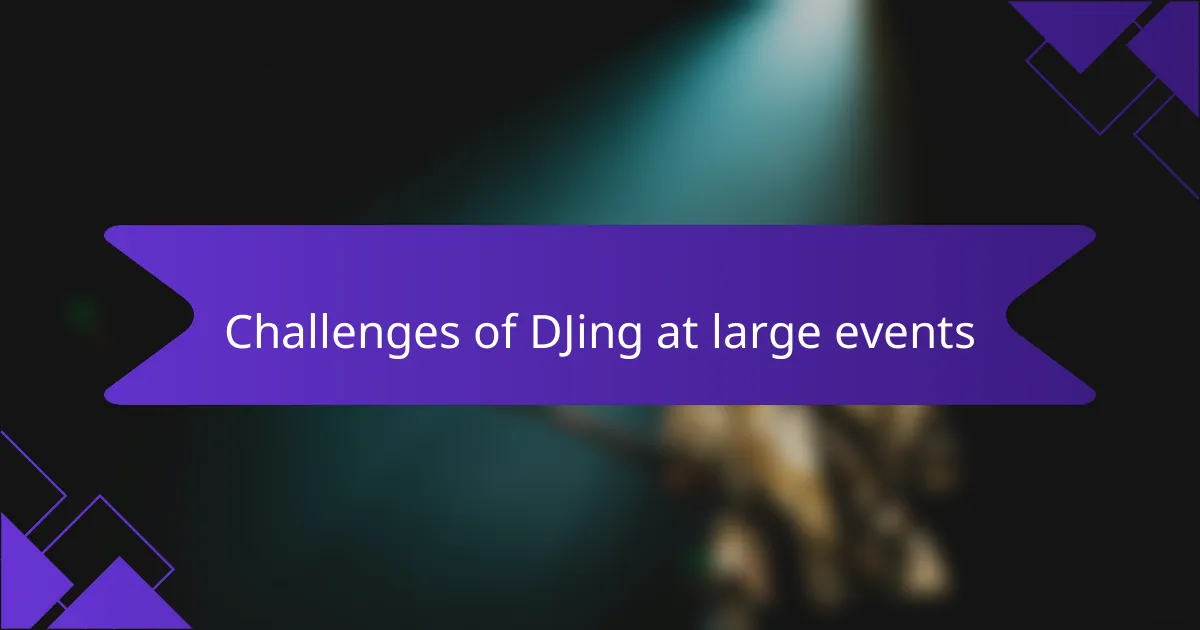
Challenges of DJing at large events
DJing at large festivals can be incredibly exhilarating, yet it comes with its unique set of challenges. I remember my first big festival gig; I underestimated the pressure of performing in front of thousands of eager fans. The adrenaline rush was like nothing I had ever experienced, but it was coupled with the weight of expectations that can sometimes feel overwhelming.
The sheer scale of these events introduces logistical hurdles that can be daunting. For instance, managing sound checks amidst the chaos of festival setups and navigating the complexities of the crowd dynamics are just a few examples of what a DJ might face. Here are some common challenges:
- Technical Issues: Equipment malfunctions can spring up at the most inopportune moments, leading to panic and frustration.
- Crowd Control: Understanding the audience’s energy and responding to it can be tough, especially in large spaces where connection feels lost.
- Time Constraints: Strict schedules can limit creative flow, making it hard to truly connect with your audience.
- Weather Conditions: Outdoor festivals come with the unpredictability of weather, which can affect both the performance and setup.
- Nerves and Performance Pressure: The larger the crowd, the greater the pressure can feel, impacting the DJ’s overall performance.
Reflecting on my experiences, I recognize that navigating these challenges is part of what makes DJing at festivals both demanding and rewarding. The joy of overcoming obstacles only amplifies the thrill of connecting with the audience in the end.
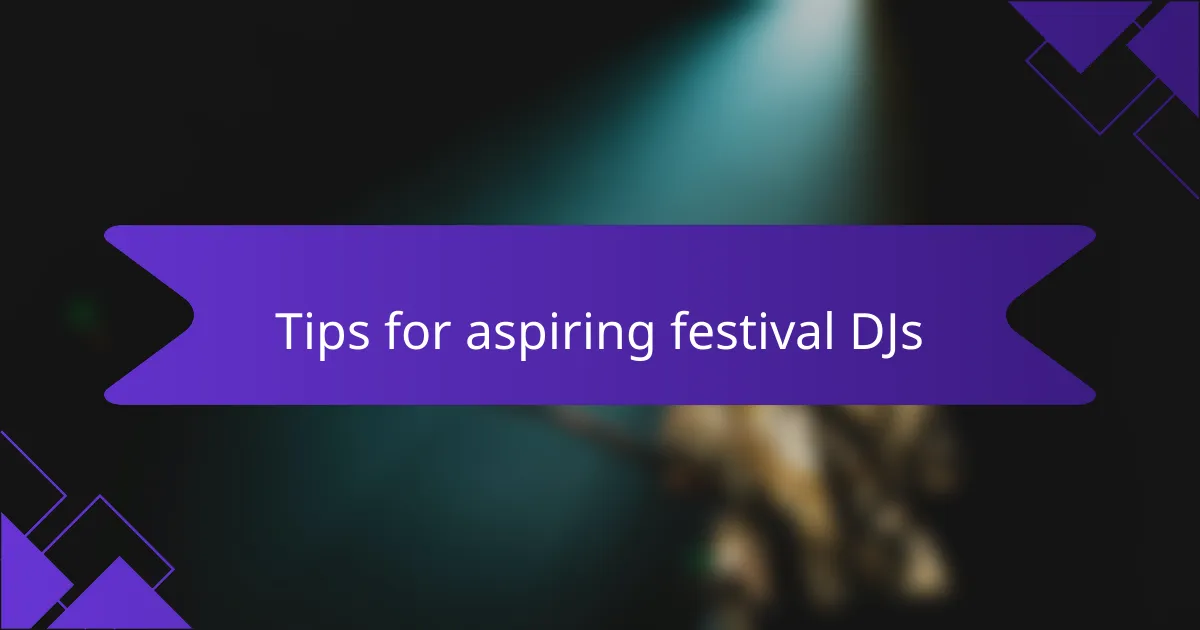
Tips for aspiring festival DJs
As an aspiring festival DJ, nurturing your unique sound is paramount. I still remember my early gigs—I would spend countless hours perfecting a mixtape that captured my style, knowing it was crucial to stand out in the vast sea of talent. Authenticity resonates with crowds, so don’t shy away from showcasing your personality in your performances.
Here are some tips to elevate your journey towards becoming a successful festival DJ:
- Focus on building your own sound; it’s what will set you apart.
- Network with other DJs and industry professionals to gain insights and opportunities.
- Invest in quality equipment; the right tools can enhance your performance significantly.
- Practice regularly in various settings to adapt to different crowd dynamics.
- Promote your sets on social media to build a following and engage with fans.
- Attend festivals as a spectator first; observe what works and what captivates audiences.
- Seek feedback from experienced DJs to improve and refine your skills.

